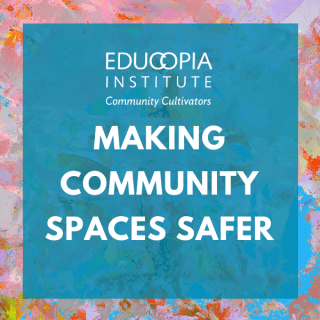
January 21, 2020
Making Community Spaces Safer: Articulating and Living Our Values
By Melanie Schlosser on behalf of the Educopia teamOver the course of 2020-2021, members of the Educopia staff will be contributing blog posts to the “Making Community Spaces Safer” series. Each post will explore one of our organizational values and describe our efforts to live into that value, including our successes, our failures, and the hard-won lessons that occur in between. We will announce new posts on the Educopia website and on Twitter.
Last February, we published a post on this blog titled “Making Community Spaces Safer.” It was both a response to an incident that occurred at the 2019 ALA Midwinter conference and an articulation of something we had been pondering for quite some time: how to cultivate communities in such a way that they form safe(r) and welcoming spaces for all community members. In that initial post, we committed to a plan of action that would move us towards that goal.
Since the publication of the original post, the Educopia team has researched, read, and reflected on how we might begin to address oppression, aggression, and inequality within our community environments. We have engaged in a series of virtual and in-person conversations—as a team, within our communities, and across the field more broadly—on the topic. In these moments of conversation and quiet, we began to surface the values that united and guided us, and we recognized a need to explicitly articulate and make those values known.
In this post, we want to introduce the most public outcome of our work so far: Educopia’s newly articulated values. We encourage you to visit our About Us page to read the full statement, but boiled down to single-word values, Educopia is caring, inclusive, community driven, transformational, open, and accountable.
Creating a values statement may not seem like a particularly revolutionary action—however, Educopia’s values are revolutionary. Our efforts to build a stronger, healthier, more equitable information management field begin with the way we care for each other. Our values ground our work and make explicit our expectations of ourselves and our partners and the conscious collaborations we facilitate together.
To accompany our public values statement, we have also created internal procedures for soliciting, handling, and responding to feedback related to the values. For example, if a community member at an event points out a way that the event could be more inclusive or welcoming, who should receive that feedback? How should we decide whether the suggestion is desirable and feasible? How should we communicate the results? We hope that having procedures already in place for these situations will help us not only to accept feedback gracefully and effectively, but also to more fully engage our communities in this important work.
Our values statement isn’t a claim that we have mastered these aspects of community cultivation, but rather is a signal of intent to ourselves, to our community members, and to our colleagues. It’s an invitation to ourselves to direct our attention to these values (no matter how many other things we have on our plate) and it is a request to others to let us know when we are failing to live up to our ideals.
In the spirit of that invitation, over the course of the next year, members of our staff will contribute additional blog posts to the “Making Community Spaces Safer” series describing each value and our efforts to live into them, including our successes, our failures, and the hard-won lessons that occur in between. We will announce new posts on the Educopia website and on Twitter.